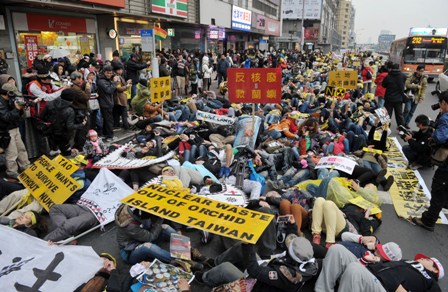In what organizers called the largest anti-nuclear protest in Taiwan, an estimated 200,000 people took to the streets in several parts of the island on March 9, 2013 to call for the scrapping of nuclear power plants. The protest was held simultaneously in northern, central, southern and eastern Taiwan just two days before the second anniversary of the meltdown of Japan’s Fukushima nuclear power plant in the wake of the big earthquake and tsunami on March 11, 2011.
The march participants demanded that the government not allocate any more funding for the construction of Taiwan’s fourth nuclear power plant in New Taipei City. Construction of the plant has stretched over 14 years and has so far costed taxpayers US$10 billion. It is scheduled to be completed later this year. But there are increasing concerns over safety, especially given several flooding incidents at the plant being built by the state-run Taipower. Protesters urged the government not to allow fuel rod filling at the new power plant. More than 6.5 million people, including the residents of Taipei, live within just 80 kilometers of the plant.
Protesters also demanded the speedy decommissioning of Taiwan’s first, second and third nuclear power plants now under operation. All three plants are around three decades old. In addition, protesters called for the removal of stored nuclear waste from Taiwan’s outlying Orchid Island immediately, as well as a review of the government’s policy to eventually phase out the use of nuclear power, and the government’s implementation of “zero growth for electricity demands.”
A spokeswoman for the Presidential Office said President Ma Ying-jeou was willing to have dialogues with anti-nuclear groups and listen to their suggestions on how Taiwan can find alternatives for nuclear power.Garfi Li cited Ma as saying that the government’s nuclear power policy is based on the premises of “no shortage of electricity, reasonable electricity prices, and honoring the promise to cutting carbon emission to the international community.”…
Previously, the economics ministry, which oversees Taiwan’s state-owned Taipower — the operator of the nuclear power plants — has said Taiwan needs nuclear power so as to avoid being overdependent on imported energy raw material and rising international prices for them. The economics minister has also warned of an energy shortage if the fourth plant is not put into operation….Most importantly, protesters argued that safety, rather than carbon emission reduction and cheap energy prices, should be top priority. They argue that Taiwan’s power plants are among the most dangerous in the world — they are located near fault lines and in densely populated areas, much more densely populated than Fukushima.said they were adamantly opposed to the increase of thermal power, adding that Taichung should increase the use of solar and wind power instead….
In Taitung, eastern Taiwan, the protesters called for nuclear waste to be removed from their area. More than 2,000 people took part in that protest, the largest mass movement in years in Taitung.”We have to take to the streets for the good of the next generation,” one organizer said.Following Orchid Island off the Taitung County, Nantien village in the county’s Dajen township has been slected as one of the possible nuclear waste storage site
200,000 TAKE PART IN TAIWAN’S ANTI-NUCLEAR PROTEST. Focus Taiwan News Channel, Mar. 9, 2013




